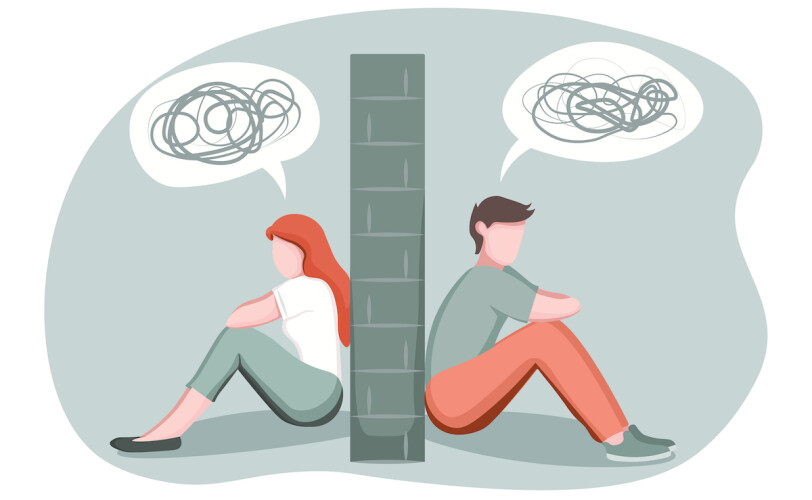The pain of the silent treatment: Dealing with stonewalling
Stonewalling can be an extremely upsetting experience, which leaves us feeling isolated, hurt, and misunderstood.

If you've ever experienced stonewalling, you'll understand how it feels to try and share your deepest thoughts and emotions with a stone wall, only to receive nothing in return. In relationships, stonewalling describes what happens when someone builds a wall against their partner’s communication. The building bricks of this emotional wall can be silence, withdrawal and shutting down.
The effects of stonewalling can be devastating to a relationship. The Gottman Institute refers to stonewalling as one of the 'Four Horsemen' of relationship breakdown, along with criticism, contempt, and defensiveness. These are the four behaviours that ultimately destroy relationships, break down trust and intimacy and leave a wave of hurt in their wake. Over time, stonewalling can become increasingly destructive and even abusive.
What does stonewalling look like?
Fans of the TV series Mad Men may recognise stonewalling behaviour in its main character, the enigmatic Don Draper, a smooth and sophisticated advertising executive characterised by his emotional detachment from others. He is somewhat of a ‘lone wolf’, who is never truly open, vulnerable or emotionally engaged with his family, friends or colleagues. His wife Betty tries to connect with him emotionally but he shuts her down.
Throughout the show, Don avoids any discussions about his feelings and avoids confronting issues directly. Instead, he withdraws, ignores or responds with silence - often then turning to drinking, smoking or affairs to avoid feeling. His stonewalling of his wife ultimately leads to the breakdown of his marriage and he starts a new relationship which again suffers from his lack of communication, and stonewalling.
Now, let’s imagine what a stonewalling interaction might look like. Alex and Jordan have been together for two years. At the start of the relationship they would spend time together regularly and they felt close. However, Jordan has been working longer and longer hours and Alex feels lonely and rejected.
One evening, Alex joins Jordan on the sofa, wanting to talk about her feelings. She starts by saying, "I know you’ve been busy but lately, I've been feeling quite neglected. You seem to be working more and more and when you’re not you are with your friends. What’s going on? I’d love to spend more time together."
Alex is hoping for a conversation with Jordan but instead, he withdraws. His body stiffens, he looks away and only responds with "Hmm.” Alex tries again, saying, "I understand you've been under a lot of stress at work. Do you think it might be affecting our relationship?"
At this Jordan grabs the remote and starts flipping through channels, offering no response. Feeling increasingly rejected and hurt, Alex persists, "You can't simply ignore this; we need to talk... I'm afraid we're drifting apart." This time, Jordan gets up, grabs their phone, and walks out of the room. Alex starts to cry.
We can see here that Alex is trying to express her feelings and concerns but in his behaviour, body language and lack of engagement in the conversation, Jordan has stonewalled Alex. She is left feeling unheard and rejected. Over time, if Jordan continues to stonewall Alex it is likely the relationship will cause both of them to feel powerless, alone and unhappy.
What does stonewalling feel like?
When we experience stonewalling, the emotions that come up can be intense and distressing. We may immediately feel anger or frustration. Attempting to break through a partner's wall of silence can feel like an unwinnable battle, leading to confusion. Why are they doing this? What is going on in their heads? We can try and guess what they are thinking or feeling, and this can lead to rumination and persistent anxiety.
As a result, we might start to doubt ourselves. Am I asking too much? Or if it persists we may start to suffer low self-esteem. Do I matter? Stonewalling can ultimately lead to anxiety and a diminished sense of self-worth. Feeling rejected, without being able to talk about it can lead us to feel helpless and powerless to resolve the situation. This sense of helplessness may cause us to worry about the future of the relationship, and over time, these emotions can even lead to depression. It can be truly devastating.
It's clear to see that the emotional impact of stonewalling can be significant and painful. That is why it is so important to address it, seek support and ensure you engage in self-care.
Why do people stonewall?
While it might feel like the person stonewalling you is making a very deliberate decision not to talk to you, it’s important to understand that it may not be as conscious as you think. It can be a learned behaviour or primary response to overwhelmingly emotional situations or conflict. When faced with intense emotions or situations, some people may shut down as a means of self-preservation from what feels like unmanageable feelings. It can be thought of as a survival response, similar to fight, flight, or freeze.
As someone who used to engage in stonewalling, I understand the feeling of being emotionally overwhelmed during conflicts. In the past, my way of coping with this overwhelm was to shut down emotionally. That meant going quiet, giving one-word answers, avoiding eye contact and eventually walking out of the room. I would freeze, then flee!
Before undergoing therapy and gaining a deeper understanding of the reasons behind this response, I found it nearly impossible to have challenging conversations with my partner. I would freeze, withdraw, and struggle to express myself. I knew it was damaging our relationship and preventing me from being authentic within it.
This shutdown served as a protective mechanism or defence mechanism. Now that I understand the roots of this defence mechanism and how to manage it I can have difficult conversations without stonewalling. My relationship has transformed and I have been able to share my feelings and hear my partner’s too.
When people stonewall and shut down, it can be that they learned this response in childhood. If you grew up in a household where open communication was discouraged, you may not have developed the skills needed to engage in emotional conversations. Not knowing how to deal with emotional communication, silence becomes an automatic response.
Others may stonewall to avoid conflict. They see it as a way to stop arguments from escalating. They may view any form of disagreement or conflict as dangerous, possibly due to witnessing conflict leading to violence or aggression in their early life. By not responding, they might mistakenly think they are maintaining peace. They don’t realise that this avoidance often makes the problem worse.
Some people may also fear being open and vulnerable with their feelings, especially if they have experienced rejection in the past. If they have felt dismissed or unheard in previous relationships, expressing themselves during conflicts can be intimidating.
Regardless of the reasons for stonewalling, it is important to approach it with compassion and curiosity. The stonewaller may want to communicate but feels unable to. While it might feel like they are stonewalling because they don’t care, this might be very far from the truth.
This is where personal or couples therapy can be beneficial in uncovering the underlying causes of this behaviour and helping build good communication skills.
However, in certain situations, stonewalling can be about exerting control. Although not all stonewallers are seeking power or dominance, it is crucial to understand how this tactic can contribute to a pattern of abuse.
When does stonewalling become abuse?
Stonewalling becomes emotional abuse when it is systematically and intentionally used to control and manipulate. This goes beyond occasions of emotional shutdown and is a harmful pattern of withholding, silence and withdrawal designed to punish the victim, undermine them and cause emotional pain. It can be indicative of narcissistic abuse and other forms of emotional and physical mistreatment.
Stonewalling can then be an insidious tactic with silence used to coerce or control. This deliberate behaviour is not rooted in self-defence but in undermining the other person's sense of self.
Recognising abusive stonewalling can be challenging, and it is crucial to seek support in such circumstances.
How can I respond to stonewalling?
Recognising what is happening is the first step. That can mean appreciating that stonewalling might not be a deliberate tactic but an emotional response to overwhelm. That means that it is important not to jump to conclusions or respond with anger. While it is natural to feel frustrated and hurt in the face of stonewalling, and it is ok to feel these emotions, you can also remain curious about your partner’s behaviour. What is going on for them?
Alongside curiosity and compassion, open and calm communication is key. You might want to try to talk to your partner about the stonewalling behaviour, sharing what you have noticed. “I notice when I talk about my feelings you seem to clam up. What is it like for you when we have difficult conversations?”
You can share how it affects you without assigning blame. Instead of saying "You never talk to me," use "I" statements like "I feel upset when we can't discuss our problems. What would make you feel safer to talk about this?"
Timing is also important. Choose a moment when both of you are relaxed and not during an argument. If the person stonewalling feels overwhelmed, suggest taking a short break to cool down.
If the stonewalling persists, seeking professional help may be necessary. A counsellor or therapist can provide guidance and strategies to improve communication and address underlying issues in the relationship.
However, it is important that you don’t bear responsibility for your partner’s stonewalling. If they do not want to address the behaviour and refuse to engage in any communication about it then it might be a sign that the relationship is not healthy or fulfilling.
That is why it is so important to remember self-care. Dealing with stonewalling can be emotionally draining. It’s crucial you have support, whether it's friends, family, or professionals. Patience and understanding are crucial, but it's also important to acknowledge your own emotional needs.
If you are concerned about abuse within your relationship, or you are worried about someone else visit SafeLives' advice page for organisations that can support you.

Find a therapist dealing with Relationship problems
All therapists are verified professionals






